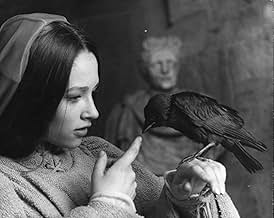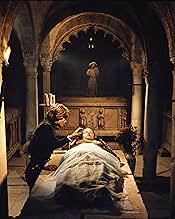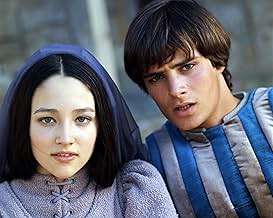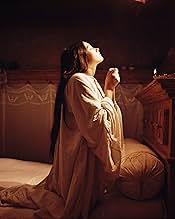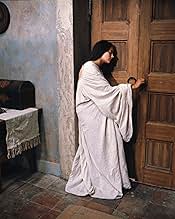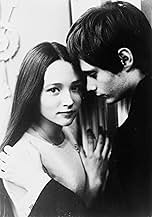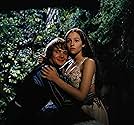VALUTAZIONE IMDb
7,6/10
36.573
LA TUA VALUTAZIONE
Quando due giovani membri di famiglie in lotta si incontrano, ne deriva un amore proibito.Quando due giovani membri di famiglie in lotta si incontrano, ne deriva un amore proibito.Quando due giovani membri di famiglie in lotta si incontrano, ne deriva un amore proibito.
- Regia
- Sceneggiatura
- Star
- Vincitore di 2 Oscar
- 16 vittorie e 16 candidature totali
Recensioni in evidenza
Truly one of the best films ever created of Shakespeare's plays. While in today's MTV - short attention span world this film may seem boring, in 1968 this film was revolutionary (I am not prejudice since I am in the MTV generation). Until this time R&J had been played by much older actors, since it was assumed they could understand Shakespeare's language. In 1968, Franco Z. gives us actors the actual age of Shakespeare's lead characters and they can act. Add to that stunning sets, costumes and music, the result is a moving artistic creation. The performances are superb, my personal favorites being Michael York's Tybalt and Milo O'Shea's the Friar. The language can be difficult and the action plotting, but one has to have patience when devoting attention to Shakespeare's plays, acted or read. Enjoy!
Zefferelli is a sporadic master. Here he is in his prime. See how he understands how to direct groups, how to continue a motion from one frame to the next, how to use color to punctuate.
What has happened here is that he has hit on a formula that works toward the problem of moving Shakespeare (a verbal, intellectual event) into film (a matter of motion and image).
It works because the play can be cast largely in terms of crowds, sometimes mobs. Never have I seen this done so well.
Much of the verbal poetry is cut, and image poetry replaced in sufficient measure to satisfy. Mercutio is rightly seen as the heart of the play, balanced by the Nurse. Both are terrific.
Oh how I wish we could combine the cinematic skills of young Zefferelli with the Shakespearian insights of Branagh and the imagination of Greenaway to do, say a Lear. Bliss in the imagining.
What has happened here is that he has hit on a formula that works toward the problem of moving Shakespeare (a verbal, intellectual event) into film (a matter of motion and image).
It works because the play can be cast largely in terms of crowds, sometimes mobs. Never have I seen this done so well.
Much of the verbal poetry is cut, and image poetry replaced in sufficient measure to satisfy. Mercutio is rightly seen as the heart of the play, balanced by the Nurse. Both are terrific.
Oh how I wish we could combine the cinematic skills of young Zefferelli with the Shakespearian insights of Branagh and the imagination of Greenaway to do, say a Lear. Bliss in the imagining.
10Philaura
Exquisite. The beauty, the innocence, the undeniable - all consuming fire of first love portrayed to the hilt. Juliet's delicate grace was breathtaking. I was totally convinced by this young acting team that they were as in love as is humanly possible. One can smell and taste 14-15th century Italy while following the locations. The performers, everyone, are as genuinely sincere in their humor and passions as one could possible imagine, bringing to life Shakespere's words like I've never seen before.
I cry every time I see it - all the way through. Mr. Zeffrelli, you are the best.
I cry every time I see it - all the way through. Mr. Zeffrelli, you are the best.
10JFClift
I have seen multiple versions of R&J, from the 30's version, with Leslie Howard (in his 40's I think) & Norma Shearer, to the most recent thing with DeCaprio & Danes. None of them touched me in the way that Zefferelli's did, & continues to do. It was one of the first DVD's I bought, because I can watch it again & again, & still be heartbroken by the ending.
The thing that shook me most the first time I saw it was that, in spite of the Shakespearian language, I got the meaning of the characters' statements immediately. The Shakespearian language was not a barrier at all. I had previously had to spend anywhere from 15 to 20 minutes before I could begin to follow the dialogue....there was no lag time with this version. To me, it will always be the definitive film version of this classic.
The thing that shook me most the first time I saw it was that, in spite of the Shakespearian language, I got the meaning of the characters' statements immediately. The Shakespearian language was not a barrier at all. I had previously had to spend anywhere from 15 to 20 minutes before I could begin to follow the dialogue....there was no lag time with this version. To me, it will always be the definitive film version of this classic.
To my way of thinking, this film should be considered when people discuss the greatest movies of all time. Every scene, practically every frame of this movie is brilliant. Director Zeffirelli went against the ancient practice of using older actors in the title roles, and the performances he elicits from teenagers Whiting and Hussey is amazing. Although he trims the dialog heavily in places (Romeo says, "But soft, what light through yonder window breaks?"- and leaves it at that) his version captures all the passion of Shakespeare's play magnificently.
The scenes at the Capulet's ball at which the two young lovers meet are about the greatest I've ever seen on screen. The famous balcony scene avoids cliches altogether and makes others pale by comparison. The Queen Mab speech, the fight, and the scene in the tomb are all exquisite highlights of this film. Even the dubbing for the Italian actor's voices and of the crowd noise is superior. It is amazing to me that an Italian could be so sensitively in tune with one of the English language's most sublime works.
Zeffirelli wanted to make a movie that spoke to youth and he succeeded, to put it very mildly. If school systems were smart, they'd pack up their freshmen and sophomores on buses every year, drive them to a local theatre and show them this movie. I can't think of a better investment in young people's education that could be made. It worked for me.
The scenes at the Capulet's ball at which the two young lovers meet are about the greatest I've ever seen on screen. The famous balcony scene avoids cliches altogether and makes others pale by comparison. The Queen Mab speech, the fight, and the scene in the tomb are all exquisite highlights of this film. Even the dubbing for the Italian actor's voices and of the crowd noise is superior. It is amazing to me that an Italian could be so sensitively in tune with one of the English language's most sublime works.
Zeffirelli wanted to make a movie that spoke to youth and he succeeded, to put it very mildly. If school systems were smart, they'd pack up their freshmen and sophomores on buses every year, drive them to a local theatre and show them this movie. I can't think of a better investment in young people's education that could be made. It worked for me.
Lo sapevi?
- QuizSir Laurence Olivier agreed to play the uncredited role of the narrator, because he was so impressed with Zeffirelli's work for the National Theatre of Great Britain, of which Olivier was director at the time. Not only was Olivier the narrator, but as Franco Zeffirelli has also confirmed, he dubbed Antonio Pierfederici's voice (due to the actor's heavy Italian accent) as well as lending his voice to other anonymous characters. He did it all for the love of William Shakespeare, and didn't accept any payment.
- BlooperWhen Romeo and Juliet's bodies are laid out in front of the ruler, Romeo takes a deep breath.
- Versioni alternativeIn the film's original release, and on DVD, the "End Titles" music continues playing on a black screen after the closing credits have ended, much as "Exit Music" used to do in roadshow releases of films. As currently (2009) shown on cable TV, however, there is an edit on the soundtrack (not on the picture) during the closing credits, so that the music ends exactly at the same time that the visual portion of the film does.
- ConnessioniEdited into The Kid Stays in the Picture (2002)
I più visti
Accedi per valutare e creare un elenco di titoli salvati per ottenere consigli personalizzati
- How long is Romeo and Juliet?Powered by Alexa
Dettagli
- Data di uscita
- Paesi di origine
- Lingue
- Celebre anche come
- Romeo y Julieta
- Luoghi delle riprese
- Pienza, Siena, Tuscany, Italia(Piazza Pio II: some shots of the street brawl)
- Aziende produttrici
- Vedi altri crediti dell’azienda su IMDbPro
Botteghino
- Budget
- 850.000 USD (previsto)
- Lordo in tutto il mondo
- 6292 USD
Contribuisci a questa pagina
Suggerisci una modifica o aggiungi i contenuti mancanti


